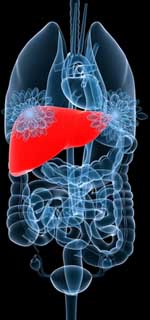Liver Health: How to Care for Your Liver

The liver is the major organ of detoxification and your health and energy are largely dependent on its efficiency. Every substance that is absorbed by the intestines must first pass through the liver before going on to the general circulation. It disposes of a daily dose of toxins produced internally from bowel contents, food, water and medications, and externally from the air you breathe.
When your liver is not functioning properly you will feel sluggish and possibly nauseous. Your liver can affect your eyes in many ways; for instance, bloodshot eyes may mirror the condition of an overloaded liver.
Poor liver function may be the cause of frequent bad breath, abdominal bloating, poor digestion, fatigue, headaches, unpleasant moods, coated tongue, sluggish metabolism, poor immune system, excessive body heat, sugar cravings, inability to lose excess weight and numerous other symptoms. On the long term liver problems increase kidney, heart, brain and cardiovascular stress.
Take good care of your liver and if you have been abusing your vital organ, use these six steps to fix the damage:
1.) That hot cup of coffee may do more than just provide a tasty energy boost. It also may help prevent the most common type of liver cancer.
The American Cancer Society estimates that 18,920 new cases of liver cancer were diagnosed in the United States last year and some 14,270 people died of the illness. Causes include hepatitis, cirrhosis, excess alcohol consumption and diseases causing chronic inflammation of the liver.
A study of more than 90,000 Japanese found that people who drank coffee daily or nearly every day had half the liver cancer risk of those who never drank coffee. UK research also found that medium-roasted coffee has higher antioxidant activity than dark-roasted.
2.) Buy milk thistle from your nearest chemist, as it is loaded with silymarin, which helps to patch up liver damage.
Silymarin is a potent antioxidant, at least 10 times more so than vitamin E. Antioxidants help scavenge free radicals, which are highly reactive substances that attack and may damage the DNA of healthy cells, resulting in premature aging and disease. Its major benefit is that it has been shown to protect and enhance the function of the liver.
The liver is the body's second largest organ, which is responsible for detoxifying pollutants and processing nutrients and fats. Specifically, milk thistle prevents the depletion of glutathione, which is a substance that is crucial for the liver's role in detoxification. It also helps promote the regeneration of new liver cells.
It can alleviate a host of ailments associated with the liver, such as hepatitis and cirrhosis. People who drink alcohol can benefit by its dietary inclusion; alcohol depletes glutathione, which milk thistle helps replenish.
3.) Hepatitis A could leave your liver in a very bad state. Although it is not a long-lasting or chronic infection, and nearly all people recover from hepatitis A within six months without any lasting health problems, the symptoms of hepatitis A may be uncomfortable and may disrupt daily activities. The average adult patient can miss up to five weeks of work because of the illness.
To protect yourself, get a Hepatitis A vaccination seven to 10 days before you travel throughout Africa, or if you plan to go to South America or Asia.
4.) Tests on rats show that protein supplements help repair damaged livers. "This may also apply to humans," says Professor Harihara Mehendale of the University of Louisiana, USA.
Body builders often take protein supplements in the form of whey protein to help them build muscles. Whey protein is derived from milk during the process in which milk is turned into cheese. Protein can be found naturally in regular dairy products, eggs, and soy, but the quality is not comparable to whey protein powder nor is it as easy to use. A whey protein supplement can provide the highest amount of branched chair amino acids, also known as BCAA, leading to your body building and retaining muscle.
However, extremely high doses of whey protein supplements could overload your liver and cause damage, so make sure you are taking the correct amount. You should never consume more than 30 grams of whey protein at one setting. You may also get better benefits of the whey if you consume the intake throughout the day, rather than all at one time.
5.) US research suggests that a daily helping of spinach will boost your liver's immunity to the effects of alcohol. If you can't stomach the thought of spinach, kiwi fruit and asparagus are also great sources of liver aid.
6.) Avoid liver disease by eating 200g of yoghurt a day. "It could reduce your chance of developing a fatty liver," says Anna Mae Diehl, a professor at John Hopkins University, USA.
|